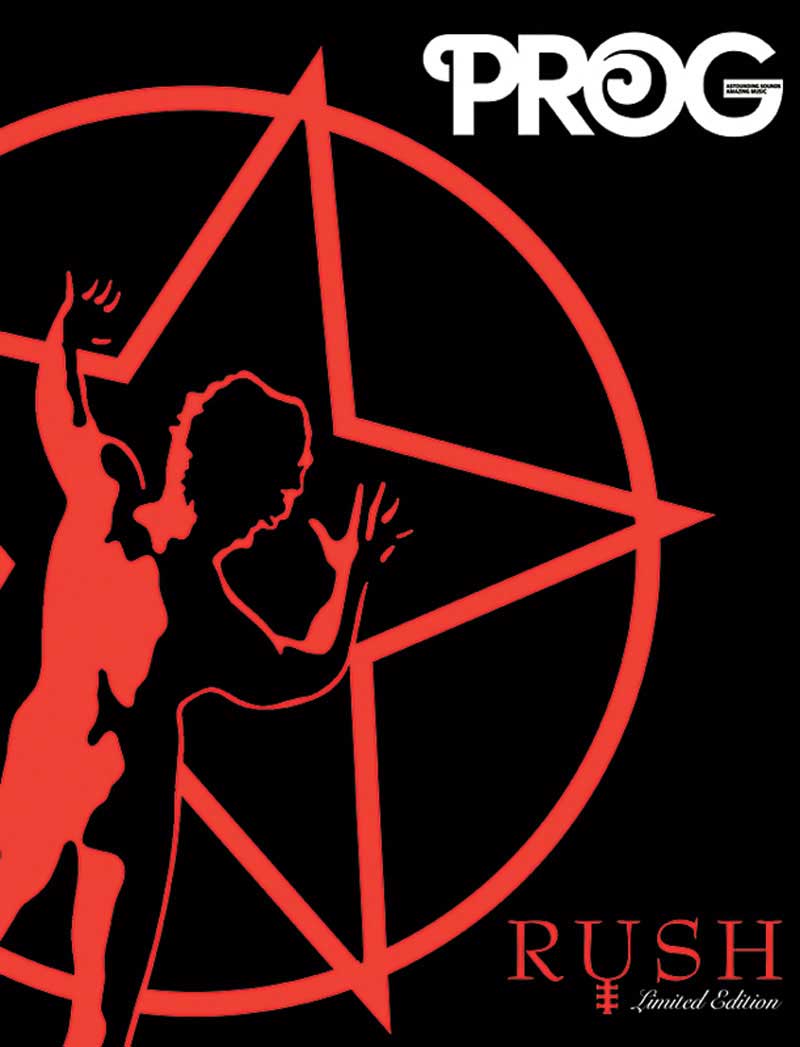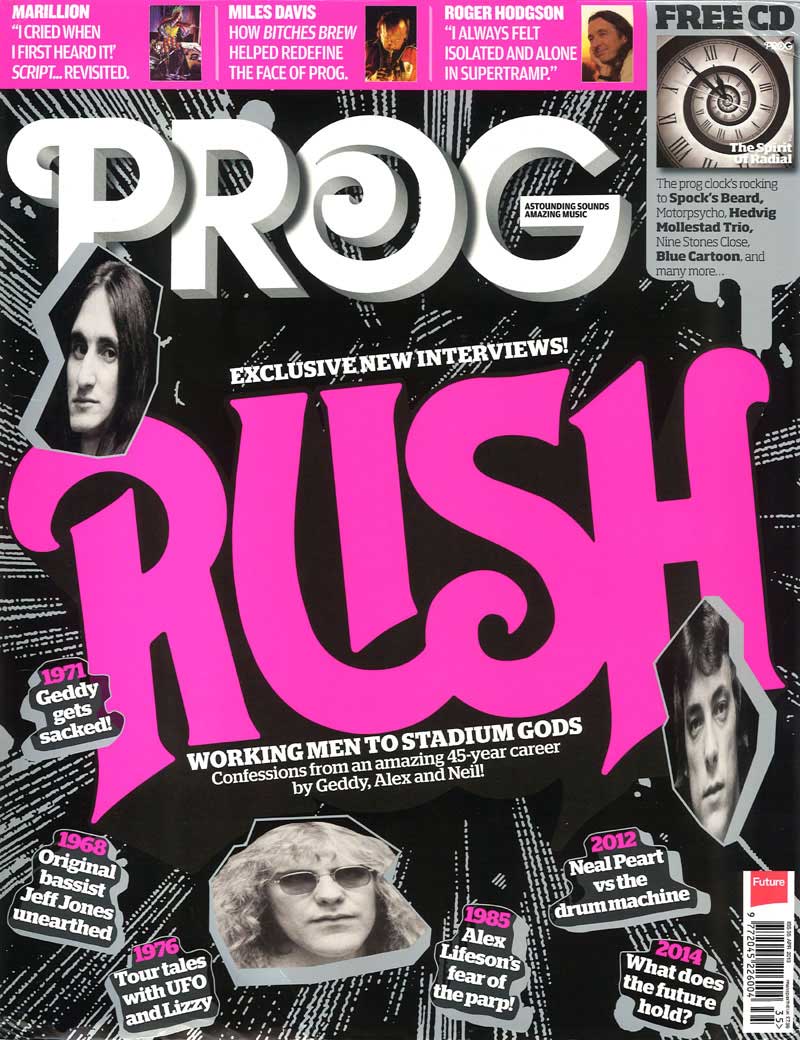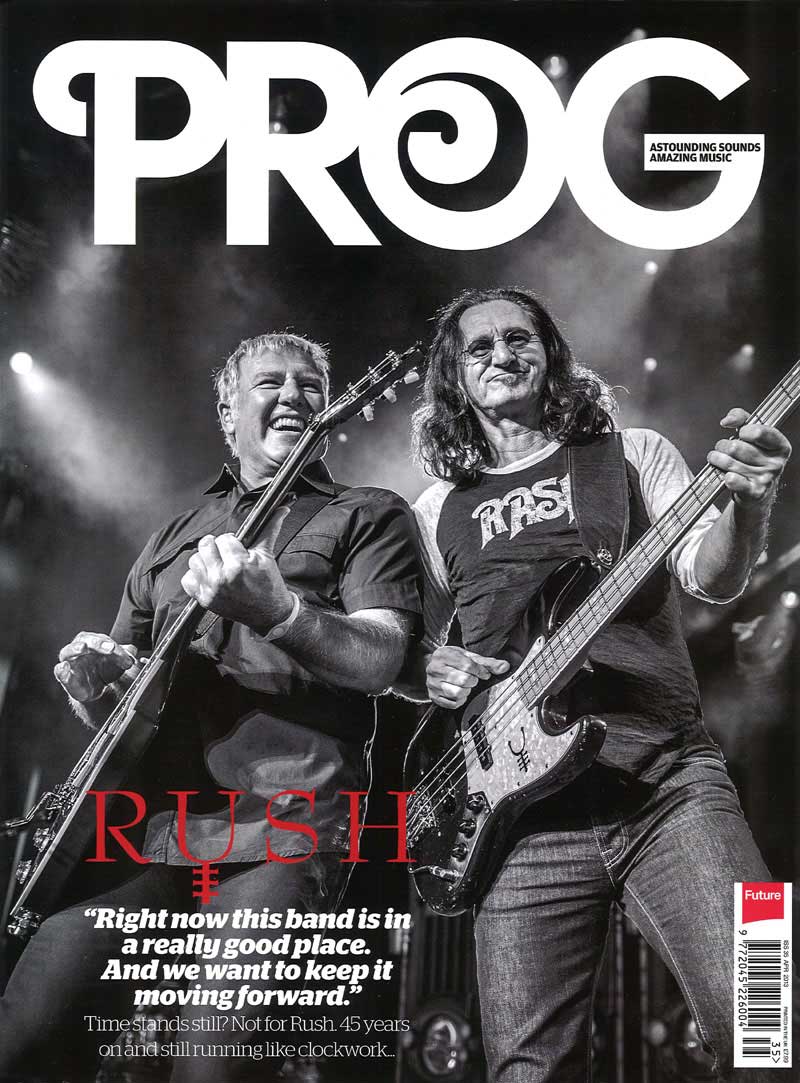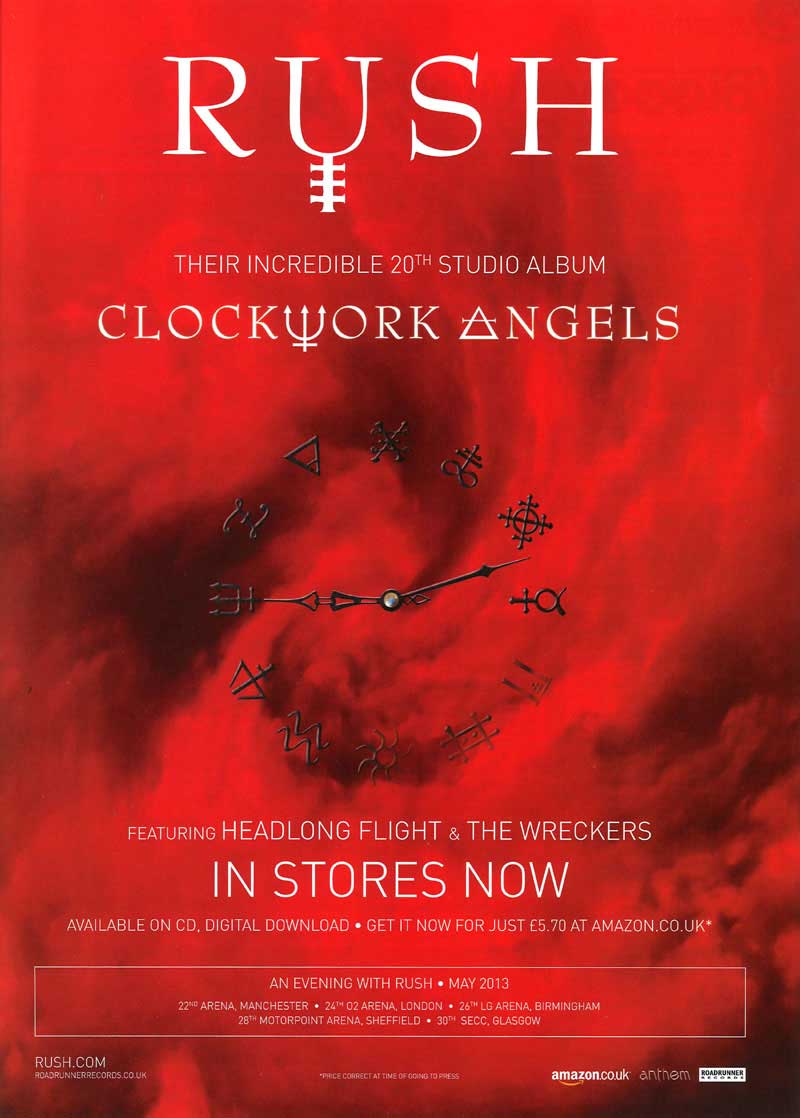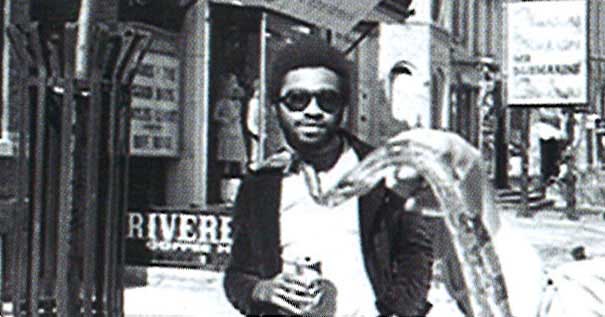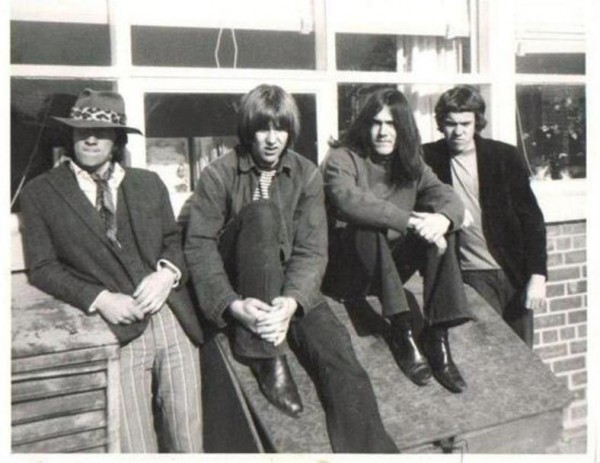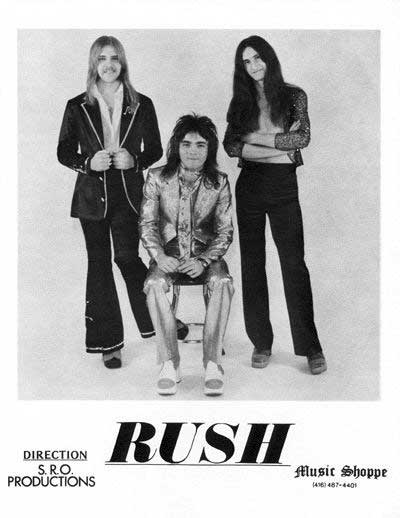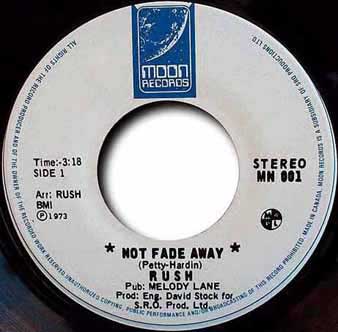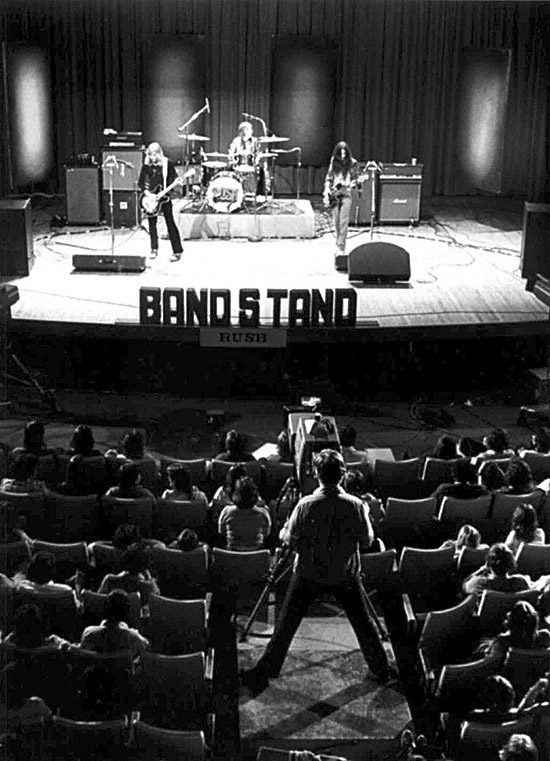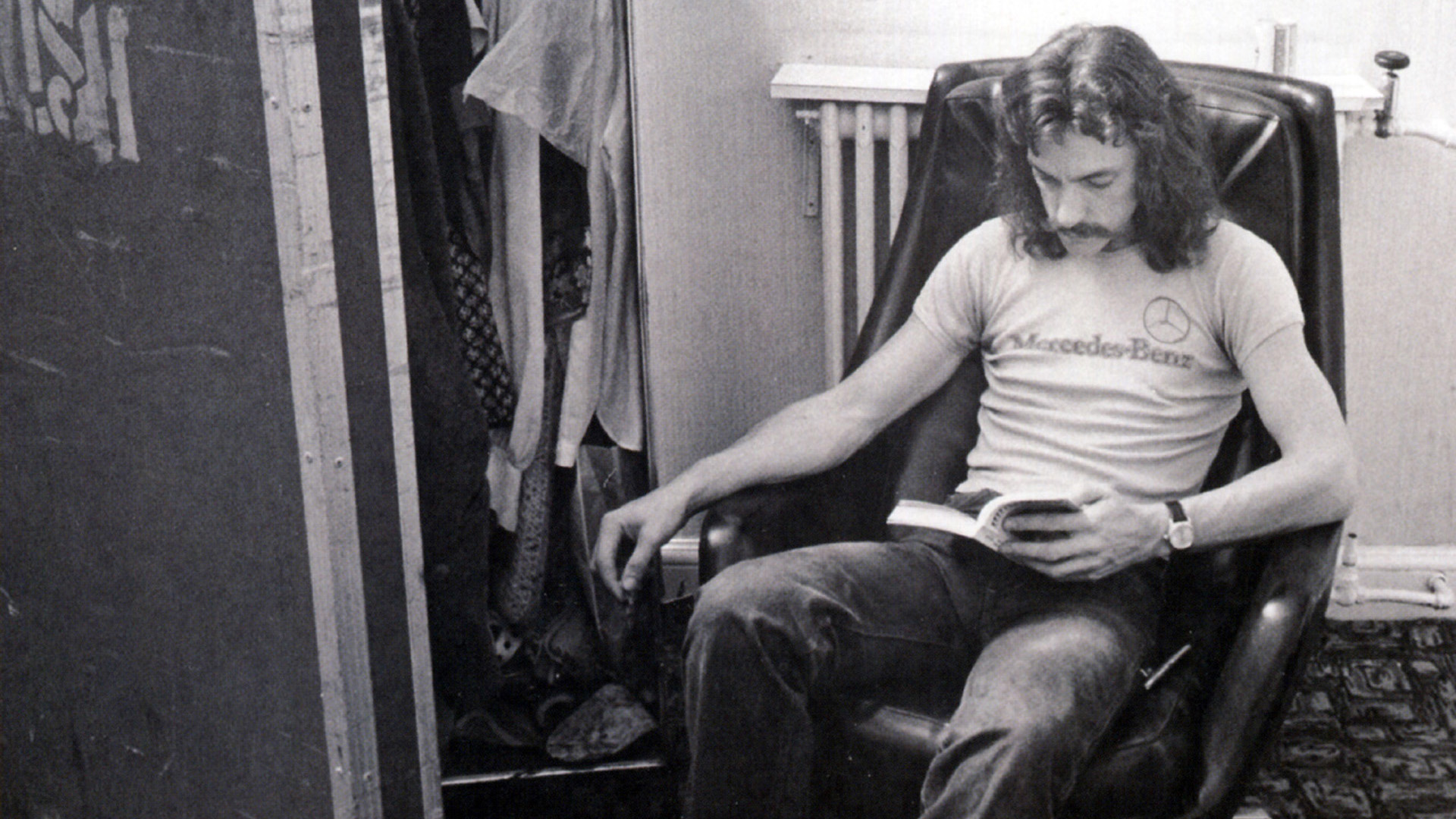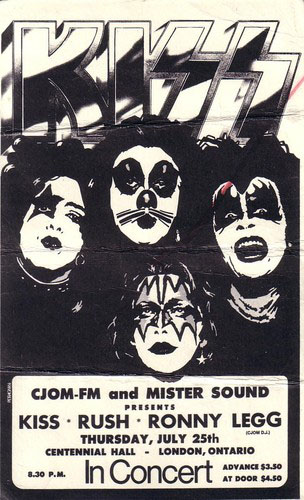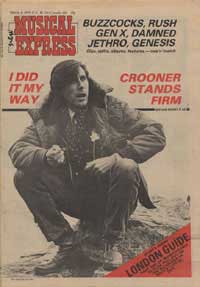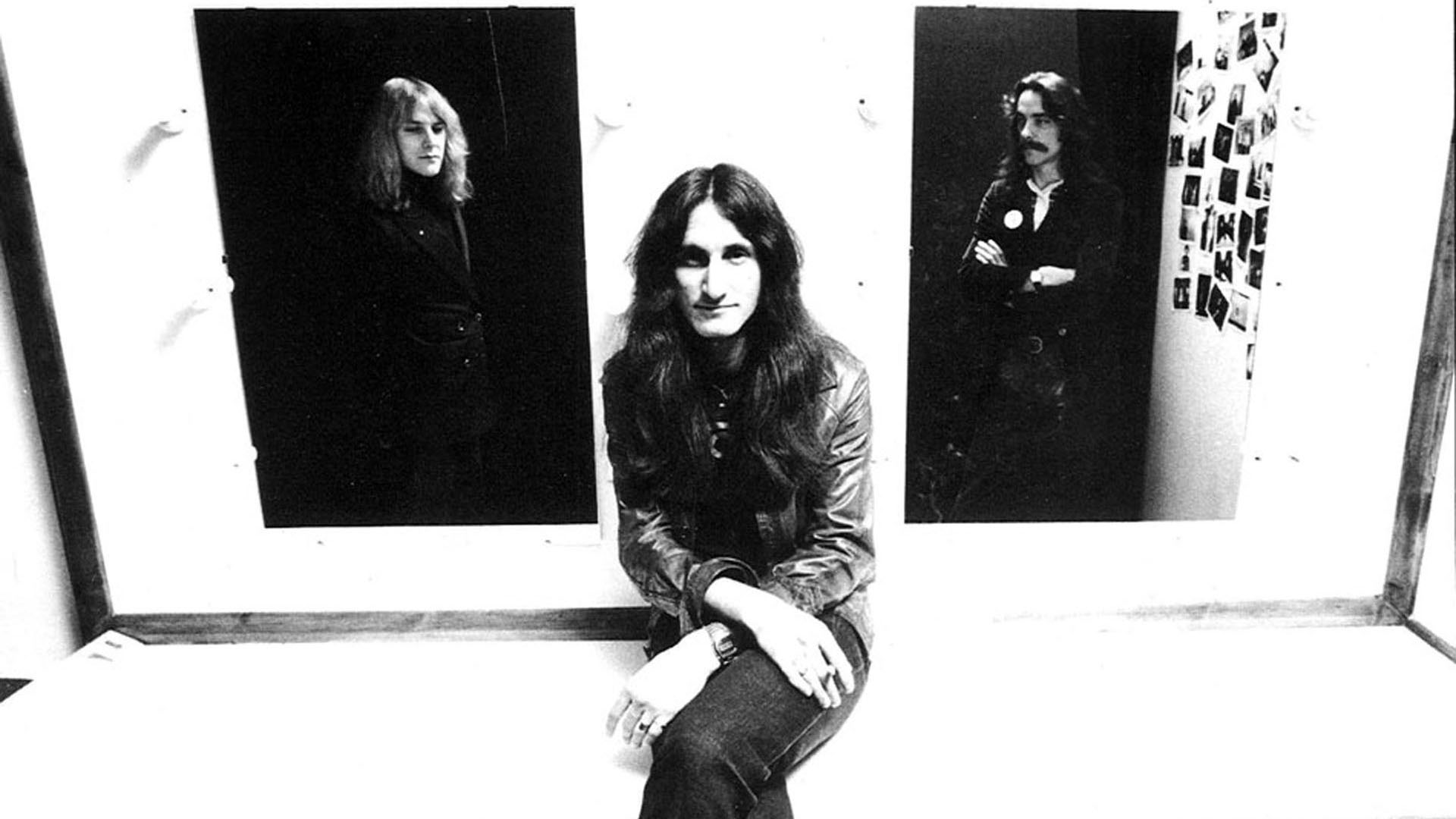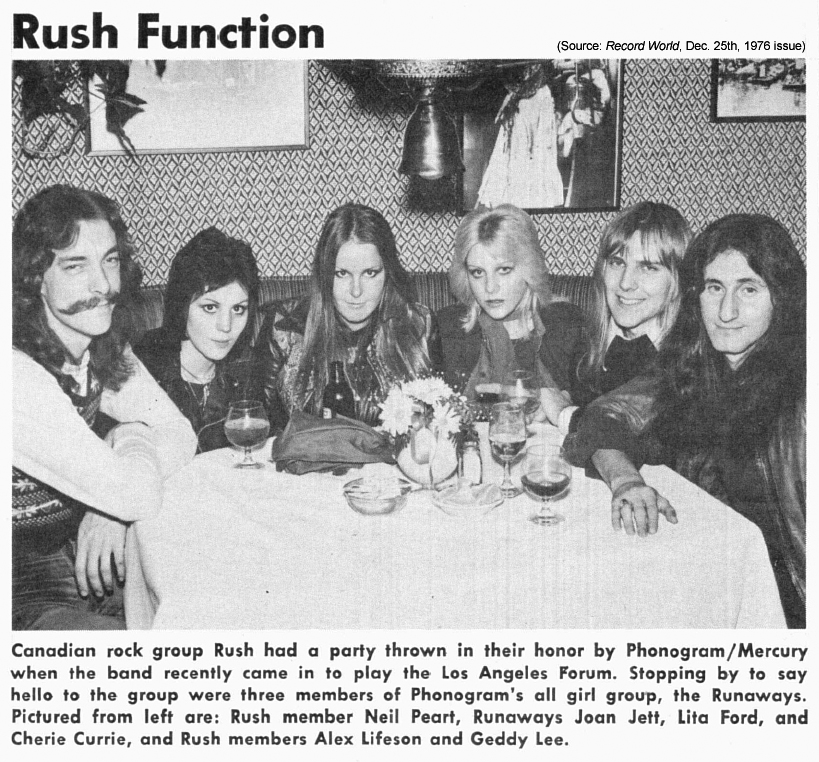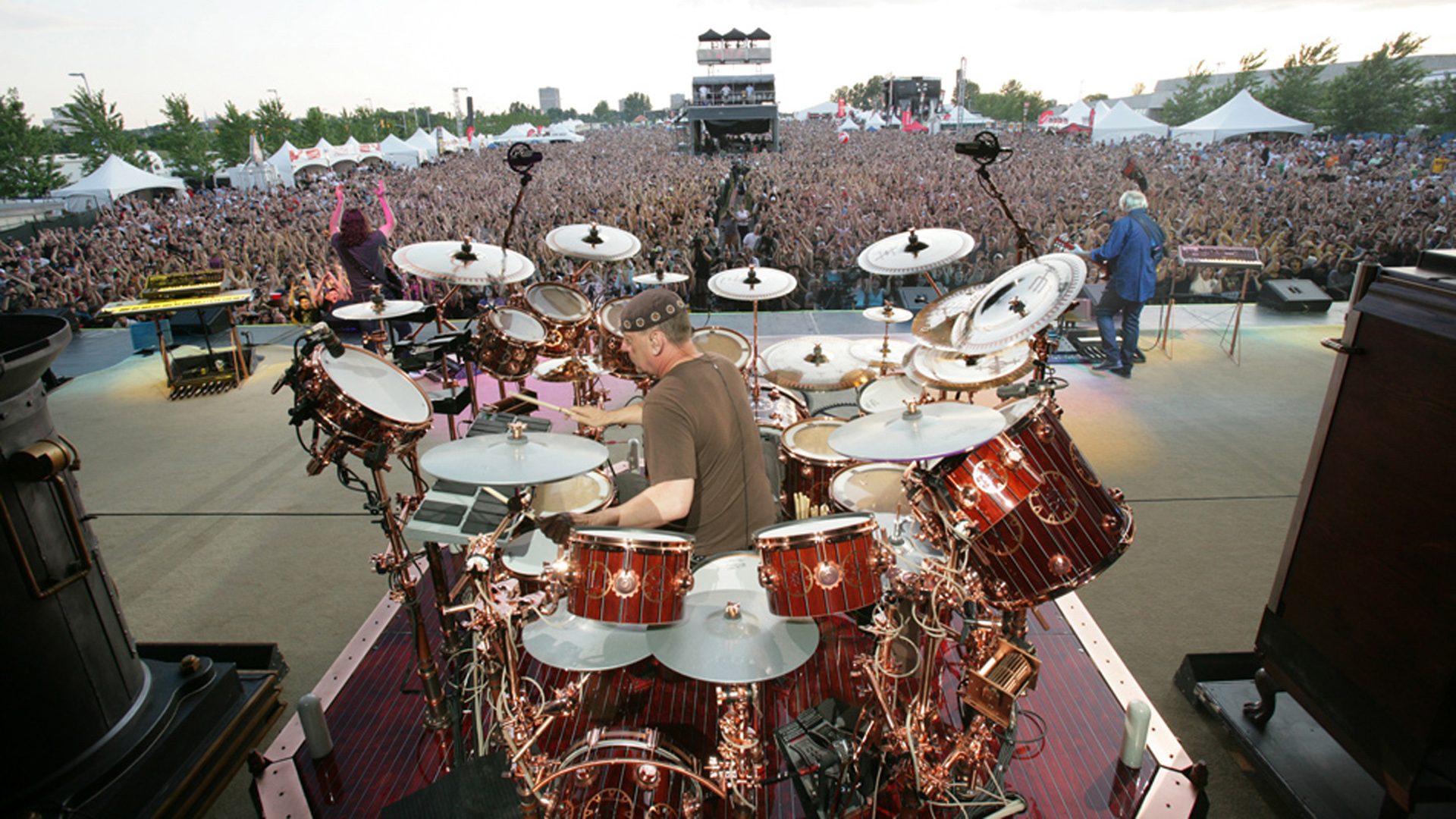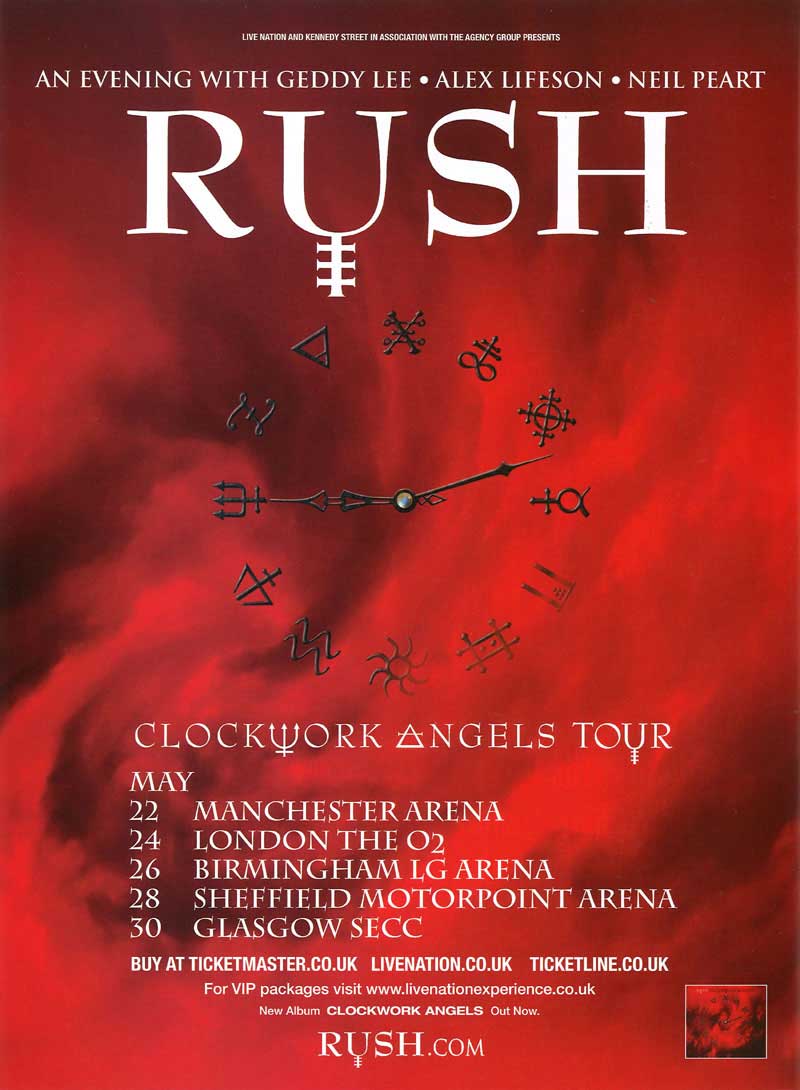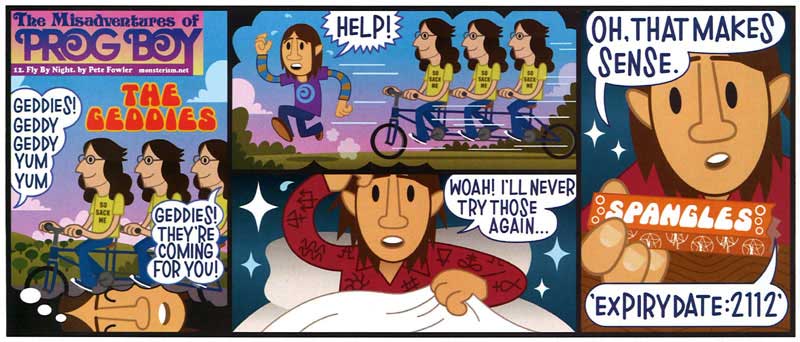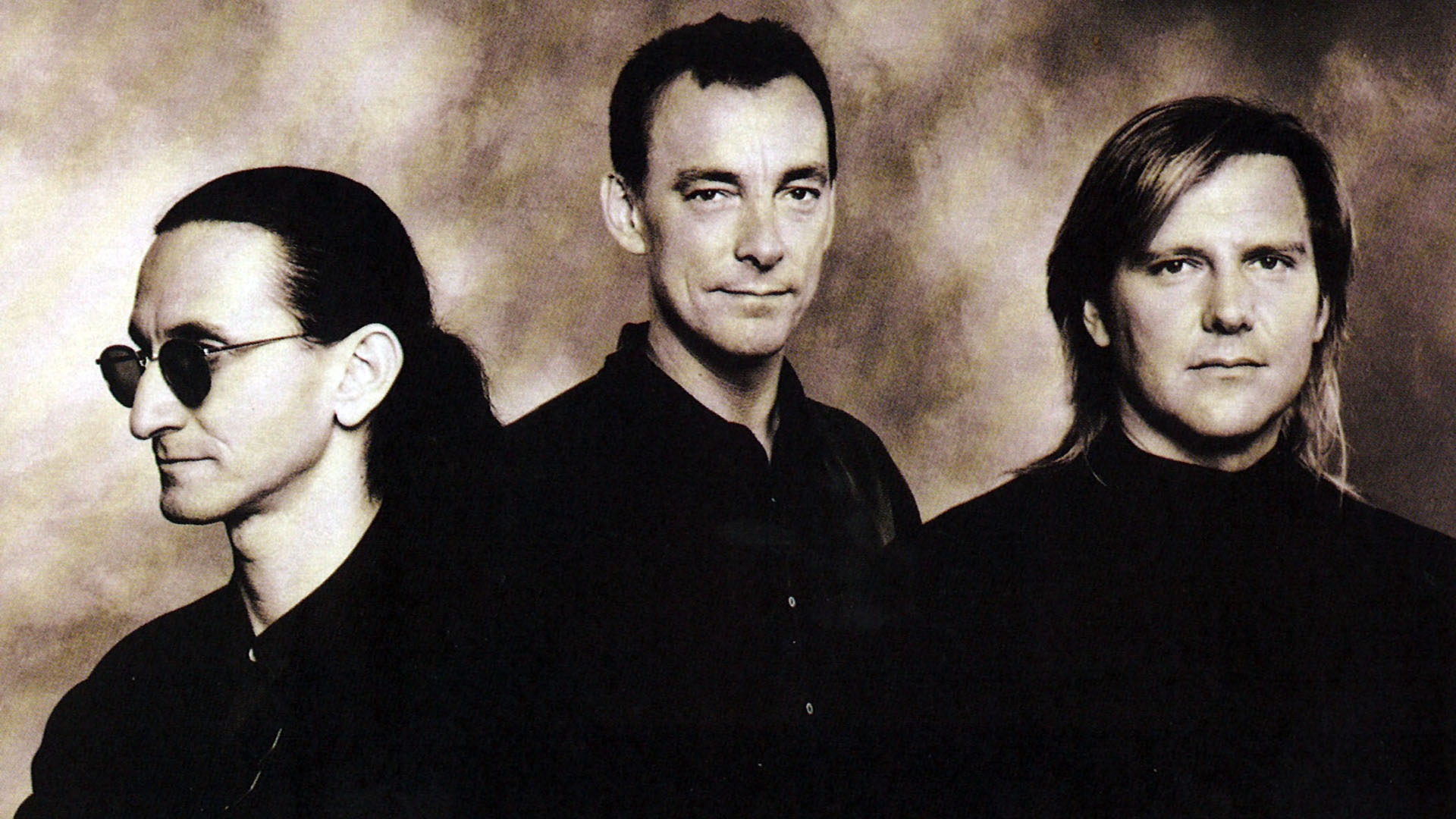PROG: RUSH Limited Edition
PROG Limited Edition Rush special, Issue 35 April 2013, transcribed by John Patuto
In their 45 years on this planet, the bond between Rush and their fans has always remained unique. The concert halls may have got bigger and they have now sold in excess of 40 million albums! And yet they remain the world's biggest cult band. That's the reason we're honouring them with this R45 Special Edition of Prog magazine. Few bands completely retain that unique relationship with their fans. But Rush are special.
As you will read elsewhere in this Special Limited Edition of Prog magazine - designed to celebrate their 45 years of existence on this planet - Nicky Wire of the Manic Street Preachers calls Rush, his favourite band, "the world's biggest cult band."
I tend to agree with him. Sure, Rush may have sold over 40 million albums worldwide, and in moments of fleeting star alignment songs like Closer To The Heart, The Spirit Of Radio and Tom Sawyer have all flirted with singles charts, but in the 33 years I've been enjoying their music, they've always seemed to remain "our secret", if you get my drift. No matter how large the concert halls became in later years, you always knew that Rush were 'with' you as a band, just as you were 'with' them!
It's that special bond between band and fan that remains all these years down the line. And that's why we've decided to honour Rush with this R45 hardback edition of Prog. We've included an extra 12 pages of content on the band that you won't find in the standard issue; an-interview published in 1990 in the wake of the release of Presto, a previously unseen Prog feature from the time of Clockwork Angels and a brand new interview with Alex, Geddy and Neil - discussing what the future holds.
We think it's a fitting salute to three special men. And I hope you enjoy it as much as we're all going to enjoy the forthcoming run of UK Rush dates - after all this time, in support of their very first, and very successful, concept record.
Hail the Working Men!
Jerry Ewing - Editor
Men At Work
By Paul Elliott
Long-lost band members, Panther Piss and Open University. Think you know about Rush? Think again. To celebrate 45 years since they formed, we asked Geddy, Alex and Neil to take us on a journey from the very first gig to the Clockwork Angels tour. They told us 45 fantastic facts that we never knew...
1. There were 20 people at the first Rush gig.
Alex Lifeson: "John and I had been playing together for three years in a little basement band called The Projection. We were as psychedelic as 15-year-old kids could be - in our paisley shirts! And we played covers: The House Of The Rising Sun, I'm A Man, stuff like that. But we also jammed with other people, and when we got the offer to do this gig at The Coff-Inn, I called up a bass player I knew, Jeff Jones. Jeff had his own band, but I said, 'Do you want to do this gig for $10? You can make three dollars. It'll be fun.'
"It was actually John's brother Bill who suggested we use the name Rush for that gig. We thought The Projection was a pretty cool name, but Bill said: 'You need something shorter and to-the-point, something with energy to it. How about Rush?' And we were like, 'Okay, that sounds good.' And it stuck.
"The Coff-Inn was in the basement of St. Theodore of Canterbury Anglican Church. It was two blocks from my house and it was a drop-in centre, a place for kids to hang out safely, drink pop and watch local bands play. There was no stage - the bands played on the floor at one end of this fairly large room. You could fit about a hundred people in there when the room was packed. But there were probably 20 people there at that first Rush gig.
"We didn't have a lot of equipment. We didn't have a mic stand so we used a standing lamp and taped the mic to it. And we had a little crappy PA system with two small columns with four eight-inch speakers in them. It was very basic, the bare bones.
"We played Fire and Foxy Lady by Hendrix, Spoonful by Cream, Snowy Wood by John Mayall. We knew about seven or eight songs, so we played them over and over. I don't recall whether those 20 people were impressed or not. I'm guessing that they weren't! But we had fun. And after that first gig we got an offer to come back the following week.
"Jeff couldn't make it - he had commitments to his actual band. So that's when I called Geddy and asked him if he could fill in. I'd known Ged for a couple of years. He might not have done the first gig as Rush, but he was there for the second one. And after that we would play at the Coff-Inn once a month. The last time we played there was in the spring of 1969, and the place was packed. I can still picture what it looked like. Just before we started, I looked at the lights shining on our equipment and the room full of people. That was so exciting."
2. Although Geddy wasn't in the band for that first gig, the cheeky sods borrowed his amp.
3. When Alex Lifeson was 15, an acid trip blew his mind.
"We'd also sneak a bit of booze out of our parents' liquor cabinets. We'd mix a little of everything that they had in there - whiskey and gin and vodka and whatever. It would come out as this horrible yellow colour and it tasted awful, so we called it Panther Piss.
"But acid ... that was incredible. I was with another friend, and after the heavier visual part of the experience we talked for hours and hours about everything - God, the universe ... It was really amazing. We really felt special, like two little individual lights in this big world."
4. Jeff Jones was in Rush for just three weeks.
5. Geddy Lee was sacked by Rush in 1969. And according to Alex, it was John Rutsey who wanted him out.
Geddy: "That's when we were a four-piece band with Lindy Young on keyboards. Lindy is actually my brother-in-law now. I was walking to rehearsal one day and Lindy stopped me and said, 'Uh, we're not rehearsing because the band broke up.' I said, 'Okay.' That was it."
Alex: "John wanted to get a different bass player, and I just sort of followed him. So we got Joe Perna on bass and we changed the name of the band to Hadrian."
Geddy: "The next thing I knew, they had reformed with another bass player and changed their name. So it was obvious that they just threw me out of the band. They didn't have the balls to tell me to my face, and that was typical of John and typical of Alex at the time.
"I suspect it was John who was behind it. He and I had a spotty relationship. My feelings were badly hurt. I didn't really understand it. But I knew lots of musicians and I just said, 'Okay, fuck you!' And I started another band, Ogilvie, with my friend Xavier Dangle - that was his real name, man! He was an excellent guitar player. And Sammy Roher was the drummer. We played a kind of white English-style blues: John Mayall & The Bluesbreakers, early Yardbirds stuff. I don't know why we were called Ogilvie - we were probably high or something."
Alex: "As Hadrian we did one or two gigs. There was one horrendous gig where Joe didn't know what he was playing - it was just a nightmare. I'd taken Charlene, my future wife, to this gig - it was our first date. And it was chaos. And then John, soon after, called Ged up and said, 'Hi, what's up?' Like nothing had happened. Geddy was really hurt by the whole thing. He wasn't so sure that he wanted to come back and play with us guys. And I wouldn't have blamed him if he didn't. But I'm sure glad he did."
Geddy: "John said to me, 'We made a bad mistake and we'd like to have you back in the band.' I was kind of torn about it, but I really liked Alex a lot. I liked the idea of being in a band that was more rocky than bluesy. So I said, 'Yeah, let's try it again.'"
6. Alex Lifeson could have been the original Rock'n'Roll Reality TV Star.
"Come On Children was directed by Allan King, a noted Canadian documentary filmmaker. His genre was like reality TV, fly-on-the-wall stuff. He had one film that was quite well known, called The Married Couple, which chronicled the demise of a marriage. So with Come On Children, he got 10 teenagers from the Toronto area and put them together on a farm for 10 weeks.
"There was a rebellious streak in all the kids that were up there, but I think Allan King was hoping for greater tension. I guess that's why the film was shelved."
7. Rush admit that their debut single - a cover of Buddy Holly's Not Fade Away - was "shitty".
8. Some guys just weren't meant to be in Rush. Lindy Young departed in 1969.
After that, Rush would always be a trio.
9. Rush got their first big break in 1971 when the legal drinking age in Ontario was lowered from 21 to 18.
10. Rush formed their own record company because almost every major label had rejected them.
11. The Real John Rutsey...
"John and I met when I was 11," he says. "I moved into the area and he lived across the street from me. We became friends. We played hockey and football and baseball and went to the same school. But John was a very insecure person. He had juvenile diabetes and I remember he never wanted to talk about it. I think he always felt it was a handicap that he had. So he was very complex emotionally.
"He was the greatest guy to be with when he was happy, but he could be so weird too. Honestly, a funnier guy you've never met, charming and engaging. But at other times he was an enigma, and it cost him dearly. He threw away so much.
"In 1974, John got ill and missed out a few months of gigs. We had a sub drummer, Jerry Fielding, a very sweet guy. And then John came back for a month of club shows. It was the best of times. We had so much fun together. But that was it for John. It was sad.
"He might not have said it, but he was very concerned about his diabetes and whether it would be manageable for him on the road. You had to keep insulin refrigerated. And also we were starting to change direction. Ged and I were listening to more progressive music - Yes and Pink Floyd. But John was more of a straight rocker. Our management thought that this could be a potential problem and I think it was Vic Wilson, Ray's business partner, who sat down with John and told him it was over.
"It wasn't more than a month after John left the band that he sold his drums. That was it. In the years that followed, I would see him from time to time, whenever we were home. I always felt an obligation to him as a friend. But the busier we got and the more we worked, it became increasingly uncomfortable and hard for us to relate to each other. I was excited about what we were doing, and to talk about those things was painful for him.
"In the 80s, John got into bodybuilding and started competing. He looked pretty ripped - his chest was just huge. It was kind of strange for me to see that, but it was a focus for him. He'd been through difficult times with his illness and he became a bit of a health nut. It was a very positive thing.
"I didn't really reconnect with him till the late 80s. We always felt bad that he missed out on things. But before he passed away, we made amends."
12. The first attempt at recording the band's debut album was a disaster.
13. When Neil Peart auditioned for Rush, he thought Alex Lifeson was a dick.
Geddy: "Alex and I promised that we wouldn't discuss anything seriously with any of the guys who auditioned until he and I discussed it. But 30 seconds into listening to Neil play I was completely blown away, so I started talking to Neil as if he was in the band - I couldn't hold back! And Alex got mad at me, He wouldn't say a word, Neil told me later he thought this guy must be a real dick because he wasn't saying anything, But there was no denying that Neil was the guy."
14. Neil became the band's lyricist by default.
15. Every lyric that Neil Peart has written has been changed by Geddy Lee.
16. Geddy Lee has a simple explanation for why the third Rush album is a bit weird.
17. Alex Lifeson blames drugs for the daft mock-Oriental intro to A Passage To Bangkok.
18. Only one band managed to out-drink Rush in the 70s, and that was UFO.
"We're good Canadian boys, and back then we were green, very wide-eyed. We were fairly nerdy, but we did have our moments. We partied. And we certainly liked to hang around and ... smoke [laughs].
"With Thin Lizzy, I never saw Phil Lynott being very wild, to be honest. He was a really sweet man. He was great to talk to and a gentle soul. It was the other guys in that band that were crazy. We drank a lot together with Robbo [Lizzy guitarist Brian Robertson], but Phil was always removed - I guess because he was into another kind of 'entertainment' ...
"But no one could compete with UFO. We had 10 too many drinks with UFO on a regular basis. And we might have been able to out-drink them for a short period of time, but over a long period of time, their stamina was quite remarkable. Pete Way [UFO bassist] was a force of nature. Most people actually need to be sober at some point during the day, but he didn't seem to require that. I remember one gig where we were backstage listening to them play and the bass just disappeared - and of course he'd fallen off the stage.
"For Pete, it was always time for a drink. One time I was on our bus listening to a Bill Bruford solo album with Jeff Berlin's bass playing on it when Pete came in. He used to call me Glee, and he said, 'Glee, what are you doing?' I said, 'Check this bass player out.' And he was shaking his head, saying, 'Don't do it! You shouldn't listen to this, Glee. It's a bad influence. Come on, let's go and have a few drinks!'"
Alex also has fond memories of those tours. "We became really good friends with UFO and Thin Lizzy," he says. "I really connected with Brian Robertson and we did a lot of drinking. It was a lot of fun and I loved playing with those guys. I watched Thin Lizzy every night from the side of the stage. They were really a great band and Phil Lynott was such a charismatic guy.
"With Lizzy and with UFO, we were all young and it was all happening for us at the same time. Now as we look back, it was really a peak in that whole rock'n'roll world. And we lived it like the young guys that we were. But maybe not quite as much as UFO..."
19. Rush are possibly the only rock band that never had groupies.
"Kiss and Rush were on two completely different paths," Alex says, "But we had a lot of fun working together. I wouldn't say there were any groupies around Rush. But there were lots of girls around for Kiss. We'd go in a room with 40 people in there and Gene Simmons would be in the bathroom the whole time, having sex."
20. Nobody knows what The Tobes of Hades are.
Geddy: "I don't know what 'tobes' are. I assumed that Neil knew, and that there must be such a place in mythology. I just went with it."
Alex: "I think the Tobes Of Hades is kind of like the waiting room to Hell!"
Neil: "Nobody knows what it means - that's what I love about it. But it's something that my friend's father used to say: 'It's hotter than the Tobes Of Hades!'"
21. By-Tor & The Snow Dog was a joke that almost backfired.
"But the guys at our record company weren't happy. They signed the band that was on the first album, and they said, 'This is not the same - what is this By-Tor shit? You were talking about Working Man and now you're talking about this crazy stuff,' It was a bit of a hiccup in the plan they had for us."
22. In 1977, Geddy Lee wanted to punch a journalist - "Very Hard".
"That guy from the NME slammed us so brutally," Geddy says. "And we were completely slack-jawed - totally shocked. Neil and him had this kind of philosophical discussion, but he was just getting the response he wanted. We didn't see that coming. We thought he was a decent guy. I remember replaying that interview over and over in my head, thinking, 'What the fuck? How did that happen?' He said these horrible things about us. So yeah, I was pissed off.
"I am not a violent type, but I wanted to punch the guy. But there's nothing you can do - the press always has the last word. I remember reading the article and thinking, 'Oh shit.' But there was not much to be done."
"My father Morris and my mother Mary were both in Auschwitz for a time. They met when they were 13 at a work camp for Polish Jews, and even though they were in this horrible environment, there was a romance - a sweet story against a bleak background. From the work camp they were sent to Auschwitz. And then they were separated when my mother got shipped to Bergen-Belsen with her sister and her mother, and my father was shipped to Dachau.
"They spent their entire teenage years in those camps. And at the end of the war there was this mad scramble to find out who was still alive. My mother did not know if my father had survived. But her brother and my father ended up in the same hospital in Munich, and when he heard that my mother was in Belsen, he had no patience to wait. And one day he walked into Belsen and saw my mother there.
"After Belsen was liberated by the British, the conditions were so desperate that they moved all the survivors into the German barracks, and they lived there almost two years. And that's where my parents were married - in the officers' quarters in the mess hall.
"In 1995, there was a ceremony at Belsen for the 50th anniversary of the liberation, and I took my mum to it. All these survivors from all over the world were there, all these elderly people and their children. And as we were having lunch in the mess hall, my mother said, 'This is where I married your father.' It was pretty heavy. There was a woman sitting opposite my mother, she was looking at her the whole time, and it turned out they had slept in the same bunk as emaciated prisoners back in 1945. It's a pretty incredible story."
23. Some Rush songs are in keys so high that even Geddy Lee struggles to sing them.
And it wasn't only Geddy who had a hard time on Hemispheres. The band's producer, Terry Brown, was driven half-mad by the lengthy and arduous recording process. "It was a very difficult album to make," says Alex. "There was a lot of tension, and Terry Brown was losing his mind. Finally, he said, 'I can't hear this record any more, I have to go home.' By the end, we were all pretty worn out by the experience."
24. The first reaction to 2112 was so bad that Rush thought they were finished.
25. The 2112 Overture was recorded in one take.
26. Punk rock helped Rush!
27. The Runaways claimed they pissed on Rush's guitars.
"The Runaways had a ginormous chip on their shoulders," Geddy says. "I remember that show. We had trouble with our gear so our soundcheck got delayed and The Runaways never got one. But we were always good to whoever was opening for us. We had no bias against them because they were girls - none of that bullshit.
"I know they said that we were laughing at them when they played, but quite frankly they were too shitty to listen to. And 40 years later they have a story to tell about it. Who knew?"
28. Neil Peart is still learning the art of the drum solo.
29. Rush still have trouble playing The Spirit Of Radio.
30. After Neil's wife and daughter died, Alex and Geddy didn't know how they could help him.
"It was just so devastating and so shocking when it all happened," Alex says. "All of us were in unknown territory. But I had a friend who had also lost a daughter in a car accident, and he really helped me. After his loss he'd worked with Bereaved Families of Ontario, which is what a lot of people do: it's their way of giving back. And he really guided me on how to be a good supporter. He told me to do things that I would never have thought of doing. And he was right. One of the things that he said was, 'Make sure you repeat their names when you're with your friend, so that he can feel that at least someone is remembering them: That's the biggest fear - that they'll be forgotten. And it's not something that you would think to do. You think the opposite: don't mention it."
"In those situations," Geddy says, "you have a tendency to try to be a little too careful. We were all stunned, we didn't know how to react. But Alex - bless his heart - is a very emotional person, and he just said, 'Well, I'm just going over there: My wife and I just tried to be there for Neil and keep a constant contact with him. We didn't live very far from where they lived, so we went over and tried to just talk and be company. That's all you can do to try to support them. You just hug them and cry with them."
31. Alex Lifeson felt marginalised in Rush during the 80s.
"I don't think I was pissed off," Alex says. "I just saw that there was a shift in my role. And at first, I was totally into it. I even played some keyboards, and I thought it was a really important and unique part of what Rush was becoming. There was this attitude: 'Let's just push them up, they're the new thing and they sound big and they sound cool.' But the guitar suffered in a lot of the mixes. That's what bothered me more than anything.
"It was a challenge. I remember thinking, 'What is this all about?' But I did see the bigger picture: I knew we were going in a new direction and this was part of it. I thought: go with it and it will all work out in the end. So I did that. I don't have anything against keyboards. I just thought that we needed to preserve the core of what the band is. It's a three-piece."
Geddy admits that he was oblivious to Alex's feelings at this time. "He had to rethink everything," Geddy says, "and that's something I never really appreciated. I was so caught up with keyboards - loving those noises and the melodies and the ability to play those things. It was a fascinating period for me. And I never realised just how difficult it was for Alex.
"He didn't object to the direction we were going in. We wouldn't have made those records if he was upset about it. It's just not the way we function. Alex went along with the ride. But the turning point was Power Windows. That was the first album where we actually put all these keyboard parts all over the tapes before Alex had the chance to put his parts down. So he had to figure out a way in, and I think that's when he first started resenting the keyboards. It made his job much more difficult, which in retrospect I completely understand.
"At the time, being the pro that he is, he just did his best. And I think he played amazing things on Power Windows. He rose to the challenge. But in a way he carried a bit of resentment forward from that point. He wasn't one to make a big deal of it, but I don't blame him for lashing out against that at a certain point.
"Still, Power Windows is one of my favourite Rush albums - certainly the most successful of the 'keyboard period' albums. Everybody has their favourite period of the band, and I thought it was great in the documentary [Rush: Beyond The Lighted Stage] to hear [Rage Against The Machine bassist] Tim Commerford speak out against the keyboards and then you hear Trent Reznor speak out in favour of them."
32. La Villa Strangiato is "A Soundtrack to a movie that didn't exist."
33. Rush did some weird things to make their songs sound just right.
34. U2's producer dumped Rush to work with Simple Minds.
"We loved what Steve had done with U2," Alex says, "and we were really looking forward to seeing how he would make us think and expand what we do. But at the 11th hour we got a message that he wasn't available. We were terribly disappointed. And we had very little time to find another producer. We ended up with Peter Henderson, who was a nice guy, but as a producer we felt him a little lacking. Quite often he'd say, 'I don't know where to go with this now, guys...' So it was hard making that record!"
35. 'One hundred and eighty!' was once Rush's catchphrase.
36. Sometimes a drum machine is better than Neil Peart.
37. Vapor Trails is the Rush album that Rush can't listen to.
"That record took us 15 months to make," Alex says. "A long, long time. We wanted to keep the essence of the raw emotion that we were feeling at the time. So in places it's a little scratchy or distorted. And in the long run, it's kind of bothered us."
"One day," says Geddy, "we'll do a proper remix of that album and re-release it. I was just talking to Neil about it and he was saying it's hard for him to listen to the album for the obvious reasons. When he hears it now, his playing sounds confused and angry - that's what he hears. I hear a kind of raw emotion and passion. We had a real strong desire to make music that had a hard-hitting effect. I just thought it could have sounded a little better."
38. Rush's biggest hit was a tribute to their favourite radio station. The station's name" CFNY. Its motto: The Spirit of Radio.
39. Alex Lifeson is the unsung hero of Rush.
"That's never bothered me," Alex says. "Neil really is the greatest drummer! And Geddy is an amazing bass player. But for me, it's better to be an important part of the union than to be a standout.
"In terms of a musical unit, I always thought that somebody's got to hold the ground. Neil and Geddy are very active players. And particularly in the early days, they were all over the place, and that activity required some sort of foundation. So it forced me to really think in terms of a rhythm guitarist, like Pete Townshend.
"Playing with Neil and Geddy, I developed a style that was as broad as I could get it. It's all about getting the biggest sound for a three-piece band"
40. For 30 years, Geddy Lee couldn't bear to listen to one Rush song.
41. Neil Peart didn't play drums for three years.
42. Neil Peart wanted to play drums for Roger Waters in 1990.
43. Sometimes Rush forget how to be Rush.
44. Neil Peart is a goof.
45. After 45 years, Rush still enjoy a challenge.
Geddy adds: "The string players are not only brilliant, they're awesome people. And Neil is loving playing with these guys. I've never seen Neil so happy on a tour in my life."
Mechanical Animals
By Raziq Rauf
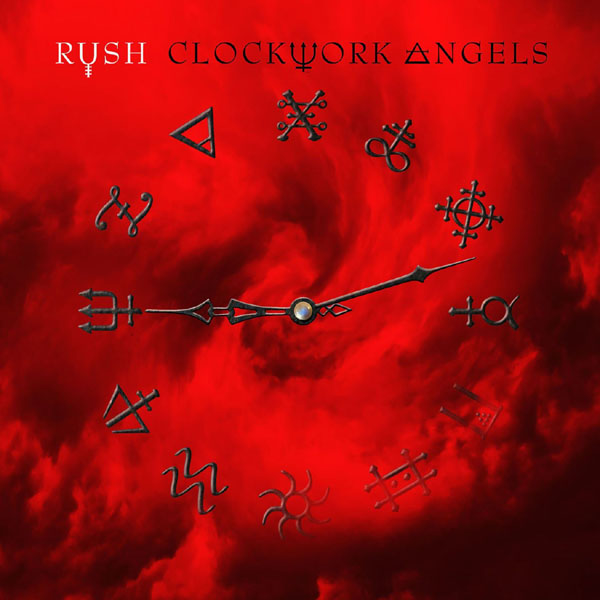
London, UK, 2012: Clockwork Angels has just hit the shelves and stereos of the world and it seems that Rush's first concept album has been going down rather well. Prog gets an audience with Geddy Lee on the subject.
When we sit down with Geddy Lee in a plush boutique hotel overlooking Kensington Gardens, Clockwork Angels has just been released and the critical and commercial acclaim is just getting to a digestible, well-rounded level. The Rush frontman is sitting comfortably in a book-lined meeting room as some tea and biscuits are delivered, and is reflecting upon how much attention he pays to what people write about his band.
"Occasionally ... Not very often. I've learned from bitter experience," he laughed. "Sometimes it's too painful."
Upon release, their 19th studio album had just flown into the top spot in their native Canada and at Number 2 on the Billboard 200 in America. Clockwork Angels would have hit Number 1 in the UK as well had the Classic Rock fanpack been chart eligible. Ultimately, whatever experiences Lee had endured in the past, at that moment in time, life was good and everyone was saying so.
"They have [been positive]," he said of current reviews. "They've been downright effusive and from unlikely sources too so I'm very pleased that people are digging it.
"Aside from Headlong Flight, which is the first song we released, I'm getting a lot of positive vibe on a song called The Wreckers," Lee continued. "It seems to be getting a real buzz, and there's also a song called The Garden, which is a bit different for us. It's a long, melodic song and both those songs seem to be getting a lot of attention - maybe because with both songs we're stepping outside our typical sound. Of course, we always did the more complicated math-rock songs but I'm glad to see the melodic side of the band get featured a little bit because that's my personal 'thing'; that's where I contribute personally, so I'm glad to see people reacting to that."
While the reception to the more melodic songs on Clockwork Angels was a pleasant surprise, the slight change in direction wasn't an accident as Rush had previously road-tested a couple of songs while on the road in 2010.
"I think the fact that we had released Caravan and BU2B during the Time Machine Tour prepped people for the direction of the record," he explained. "That really helped us finish the record because we knew we had two songs that got such a favourable crowd reaction and it was great to go back and remix those two songs. I'm amazed at the difference. I think that they sound so much bigger than the previous versions of those songs so I think that's a cool bonus."
How about writing? It's an ongoing process for many bands but having just released Clockwork Angels, have they got any new songs ready to play on tour, like on the Time Machine Tour?
"We joked about just keeping writing and maybe putting out a double record because we seem to be in a groove and the songs just keep coming," he laughs.
"Old albums, we used to do about 20 minutes a side, 40 minutes of music, and this album is already 66 minutes of music so it's almost like three sides of vinyl. It wouldn't have been a stretch to write two or three more songs and have a double record, but I expect after a break we'll be writing again and see what kind of direction that points us in."
There was a time - not so long ago, either - when Rush were not the plat du jour. Despite having sold an estimated 40 million records worldwide over their 45 years as a band, amazingly, there was a period when they were not in the elite class. Even more surprisingly, there was a time when the band had a commercial slump.
"When we first came out, we had the misfortune of being in the shadow of the kind of legends that we admired and learned from so we were always kind of ... diminished by their existence, and rightly so," he explains. "When you're influenced by big bands like Yes, Genesis and all those bands, why would you turn to these bands who are just learning from that thing? One of the great benefits of not going away, and continuing to work on your craft, is that eventually you get better and better at it and eventually we found our own voice.
"I think 2112 was that album for us," he said without hesitation. "2112 just sounds like us - it doesn't sound like anyone else. Then, as the taste of music changed, we were carrying on with this overcomplicated rock and that wasn't always where the tastes of music were so I think we were relegated to this kind of dinosaur status as a band that liked to play loud, liked to play hard rock, liked to have proggy overtones and tell silly little stories in their music."
"A funny thing happened after 35, 40 years," he continued. "Music goes in cycles, right. I guess a lot of young people discovered us and through our older songs and through our playing and started to appreciate that we do a thing that very few other bands do."
Having already philosophised about the cyclical nature of musical trends and the band's unique style, Geddy Lee is unequivocal about not really paying too much attention to the relative status of Rush.
"We just do what we do," he said. "The beauty and fortune about this kind of revisionist view of Rush is that not much has changed with us. It's external things that have changed and we just enjoy it while it's here because what got us here is just us being us, so we're not going to change now."
The influence of the 2112 album is strong and wide-ranging. For example, in 2011 two members of Swedish metal band In Flames (bassist Peter Iwers and guitarist Bjorn Gelotte) opened a restaurant in their home town of Gothenburg called 2112. Needless to say, they're Rush fans.
"Somebody brought me a T-shirt and I keep hearing about it. I expect a free drink when I arrive!" Lee laughed before talking about his thoughts on such a bold tribute. "I'm always happy to entertain drunk people. It's a huge compliment when someone thinks so much of your music that they are inspired to name a restaurant after you. I think that's really awesome. The other day I was sent an email from the chef who's putting on a special dinner in Toronto where every dish he's serving is inspired by a different song on Clockwork Angels."
When asked if it was the most effort a Rush fan has made to pay homage to the band, he thought long and hard. "It's one of the more unusual ones, I think. Rush-inspired food is something you don't really think about. I'm afraid of the result. We've had, obviously, pieces of art that fans have been inspired to make and I hear all the time about kids studying our music in school, and that just blows my mind, but Rush-inspired food? That's a new one. It's frightening to think about. Who knows what Carnies tastes like, you know?"
While the album was released in June 2012, Rush weren't touring immediately. Starting their North American tour in September would allow their fans time to get to know the new album first, before arriving in Europe in May 2013. So what does their summer entail?
"Right now we're deeply into pre-production," he explained. "There's daily meetings about designing the look of the show and designing the rear-screen animations that we love to do for our tours, back and forth emails between the three of us: 'Let's try this song in the set. Let's try that song in the set.' So we're at that very nervous stage of planning the tour and when I look at the potential set list right now, it looks about four hours long and that scares the hell out of me! We'll get it done but when I leave London I'll go home and go straight into rehearsals. It's going to be a long summer of rehearsals."
Having been an incredibly successful touring band for the best part of half a century, however, there must be some facets of touring that have become easier.
"I think the fact that we travel on our own schedule and we use a charter plane," Lee explained. "For me, that enables me to get more sleep and recovery because a three-hour show really takes its toll on my voice, and physically. The fact that we have our own schedule means that I can leave a venue and I can be in the next city before 2am and I can get a full night's sleep instead of sleeping on the bus. Sleeping on the bus was always tough for me. Thirty years of that really took its toll.
"Neil still sleeps on the bus - he loves it and bless his heart, I can't do it any more," he laughed. "He's a mental case. He's riding his bike for hundreds of miles every day so he's a driven madman so he manages to function on very little sleep. I don't know how the fuck he does it."
While some things have changed, some of the same problems remain.
"Just keeping my voice in shape - I live in constant paranoia," he said. "Not to diminish the other instruments but being a singer is different. When your voice is your instrument, you're subject to environmental things much more. If I was just a bass player, I could be sick and still do my gig. Drummers, it's a little difficult too because it's so physical I think drumming and singing are the two most fragile aspects of touring so I live in constant fear of the air conditioner, of the environment, of the food I eat. So it's my biggest worry on the road and it's not until that last gig is done where my shoulders come back from up around my ears."
Aside from writing, recording and performing live, there are many tasks that require completing to keep a band going and seeing as Rush have managed to do that for 45 years, they must have found a system that works. Every major band has a strong management team around them but Rush are one of the most proactive groups around. Each member takes personal care of the band. This is why they've survived and thrived for so long. Geddy Lee took us through the various duties that each band member has taken upon himself over the years.
"I co-ordinate a lot of the production for the show. I seem to be the point guy for the lighting designer and the animation people and the script editor and I enjoy it - it's not a drudgery, by all means," he explained. "I try to include the guys as much as possible but we all have our own responsibilities. When we're doing an album, Neil is really involved in the art design of the cover. I don't try to step on his toes because he's really good at it and when it comes to mixing the audio or doing a 5.1 project, Alex likes to take the forefront in overseeing those kinds of things.
"When it comes to the tour, my area's always been organising the look of the show. They leave it to my judgement, but of course I fill them in and keep them in the loop. If they don't like something, we change it. It works out well."
So what's going to be the next challenge for Rush then?
"It's hard to say," Lee ponders. "We've worked a lot over the last five years and we've worked a lot around the world. We have been touring quite a bit so I think it'll probably be time for a bit of a break. It'll enable us to recharge our batteries and figure out what to do next. Something will come along. We've got a few ideas that we've talked about briefly, but there's a lot of work ahead so I think we'll be due a holiday."
Closer To Their Hearts!
By Paul Elliott
2013 is another landmark year for Rush. On April 18, the band were finally inducted into the Rock And Roll Hall Of Fame, and in August Rush will end a world tour in support of their current album Clockwork Angels - a tour that has seen the trio break new ground by performing on stage with a full string section. But what's next for Rush? There has been talk of another tour in 2014 to mark the 40th anniversary of their debut album. And after the phenomenal response to Clockwork Angels, are they thinking about the follow-up? Prog discusses the future with Geddy, Alex and Neil.
It was Nicky Wire of the Manic Street Preachers who described Rush as "the world's biggest cult band". Rush have sold more than 40 million albums worldwide, and in the US, only two rock bands have had more consecutive gold or platinum albums: The Beatles and The Rolling Stones. But there was only one point where Rush had genuine mainstream success - in the early 80s, when The Spirit Of Radio was a Top 20 UK hit, and the Moving Pictures album sold four million copies in America.
What has sustained Rush through such a long career is a large and loyal fan base - specifically, people like Nicky Wire, who has bought every Rush album and is happy to spend hours debating the political content of 1977's A Farewell To Kings or the influence of new wave on 1982's Signals. And for Rush, their induction into the Rock And Roll Hall Of Fame was a testimony to those fans. "So many of our fans were excited by it," Alex Lifeson says. "They felt vindicated for their support and for their constant harassment and needling of the Rock And Roll Hall Of Fame. And at the end of the day, what it means to our fans is the most important thing."
However, Geddy Lee reckons that there are other bands out there who are more deserving of this accolade. "I don't understand why Deep Purple and Yes are not in the Rock And Roll Hall Of Fame," he says. "Both of those bands changed rock. Rush would not be here without them. They're important bands and they're ignored, and I don't get it."
But he agrees with Lifeson that Rush owe this honour to their fans. "It's really their award in many ways," he says. "It was the fans that made it happen, and I'm very happy for them."
Lee is also delighted by another award that was bestowed upon Rush this year. In March, Canadian radio station CBC hosted a public vote to find the nation's favourite homegrown rock anthem. The winner was Closer To The Heart, from A Farewell To Kings. "I think that's fantastic," Lee says. "Maybe we should re-record it now. It would be fun to do a new version of it."
But is that likely to happen? "I would guess not," he admits.
Rush have been here before. In recent years, they have worked at remixing their 2002 album Vapor Trails, but they are a long way from finishing the job.
"There are two schools with that record," Lifeson says. "The way it is ... is the way it is. It represents that period. But that record has always been a bit problematic in that it doesn't sound great to us. The production on it is not up to the standards that we usually set for ourselves. We get downright anal about recording - although less so now than in the old days. So with Vapor Trails we've remixed a couple of the songs. And we intended to remix the whole record, but other things came along. We've been so busy. It's not a priority."
For Rush, the real priority has been to look forward, not back. And with Clockwork Angels, they created a late-career masterpiece - arguably the band's best album since Power Windows in 1985.
"We had a lot of fun making Clockwork Angels," Lifeson says. "And after so many years of working together, I think we really reached the ultimate in our working relationship. There's such absolute trust in each other. There's such enthusiasm and respect, there's such a joy in working together, and there's no tension, absolutely no ego involved. We've worked towards that. And the reviews of this record have been so positive. I don't know if I've seen a bad review. In the past, the reviews were mostly on the nasty side."
Certainly, Clockwork Angels is one of the most ambitious records Rush have ever made. It's their first fully realised concept album, and in its complex structure there are echoes of the band's classic 70s albums, such as 2112 and Hemispheres. Lee credits their producer Nick Raskulinecz for helping Rush to reconnect with their past.
"Nick is a constant reminder that the best Rush can be is to be Rush," he says. "He gave us confidence to restate some of the very strong tools that Rush already possess that we had a tendency to shy away from. If you have a desire to write a part that's overly complex, just do it. Don't second-guess it. Don't be afraid to be who you are.
"As a songwriter, sometimes you think with the wrong hat. Like, what does this part really say? Should I be serving the melody here, should the bass part be a little simpler to let the melody flow? As a bass player you want to play more. So sometimes a producer is the best one to sit outside that and say, 'The melody sounds great and it won't be bothered by a more complicated bass part, so follow your instincts and do it.'
"That's what Nick brings to the table. And he also has an unflappable amount of enthusiasm, which for a band that's been around the block as many times as us is really important."
According to Neil Peart, every Rush song is written to be played live, and Clockwork Angels was no different.
"We make our songs the way we do because we're going to play them live a thousand times," he says. "And we make them interesting and difficult and challenging, because there's not one song we're playing now that we hate. You're taught in prose writing: what does the reader need to know? When I make a description or recount a dialogue, what does the reader need to understand for what I'm trying to explain here? That's a time-honoured mode of thinking.
"And I describe that as very much part of my drum style too. When people say, 'Why, in a drum part, do you start off simple and then the variations become more and more complex?' I say, 'I want to give the audience what they need to understand this rhythm.'
"If it's a song like Freewill or Subdivisions, with complicated rhythmic changes, I state them as clearly as I can off the bat - for the listener. Okay, here's what's happening here: now watch me play with it. And that's a reason for why my drum parts are arranged that way, and the reason why our songs are arranged that way - it's because they're all designed to be played live."
On the band's current tour, an hour of material from Clockwork Angels is performed in one marathon session. "That demands a lot of patience from our audience," Lifeson says. "But people have really been getting into it. That's very gratifying."
Lee adds: "It's like we're two bands out there. The first set we're the opening act for ourselves. The second set is everything but the kitchen sink. And there's quite a wide variety of stuff that we're doing."
Currently included in the set-list are songs Lee refers to as "deeper cuts" - such as Grand Designs and Middletown Dreams from Power Windows, and The Body Electric from Grace Under Pressure. And Peart is especially happy with the latter. "I love Grace Under Pressure so much," he says. "I love the fact that that album and [1987's] Hold Your Fire are two that are perhaps loved by fewer people but they're loved more, you know? And I think we as a band all share that feeling."
WHAT ALSO helps to make touring "fun" for Rush is a schedule befitting of gentlemen of a certain age. Peart is 60; Lifeson and Lee are 59. Rush tours are now divided into manageable chunks. The days of gigging for months on end, year in year out, are long gone.
"In the beginning," Peart says, "you just want to play all you can for anybody you can anywhere. You're all supply. But we realised early on that the hardest thing for a band to learn is to say no. And then it got to the point where we got a little bit of popularity and suddenly it was, 'Oh, guys, can you do two shows on that day, and can you do a 500-mile drive tomorrow night to the next show, because people want you?' And if you say no, you feel like a creep. Because of the values that you grew up with as a suburban kid, you feel uppity about saying no - you're too 'good' or something. So we would do like 10 shows in a row, driving ourselves night after night after night. And it was soul destroying. But no one told us we could say no."
Even now, they have difficulty saying no to more touring. "This tour finishes in August," Lee says. "And after that, we'd like to take a year off. We need a break. We're a little tired. And to be honest, we've been a little overexposed with back-to-back tours. But there's a lot of pressure from management about doing a 40th anniversary tour in 2014. It will be 40 years since the first album, and they think that we should do something special for that."
Lifeson is not entirely opposed to the idea of a 40th-anniversary tour. "Maybe we'd consider doing one song from each of our 20 albums," he says. "And we could put in some different songs - not always depend on Tom Sawyer and The Spirit Of Radio. But I always say that before a tour and it never happens. It would be a lot of fun to go through the whole history of the band. But in our minds, it doesn't really matter if it's the 40th or the 41st anniversary."
Lee agrees. "I wouldn't say no to a 41st or a 42nd anniversary tour," he says, laughing. "I'm not against the idea of doing an anniversary tour - I just don't know why it has to be the number 40. I think a 42nd anniversary tour is much funnier. Or wait till 2015 and do the 40th anniversary of By-Tor & The Snow Dog!"
He is, of course, joking. But there are many Rush fans who would love to see Rush play a set based on their two albums from 1975: Fly By Night (featuring By-Tor & The Snow Dog, Anthem and a title track that Stereophonics occasionally play at soundchecks); and Caress Of Steel, which includes two of the band's most over-the-top prog epics, The Necromancer and The Fountain Of Lamneth, plus Lakeside Park, a tune Wire claimed was ripped off by The Clash on the track Lost In The Supermarket from London Calling.
And although Caress Of Steel was the biggest flop of the band's career, selling so poorly that Rush were very nearly dropped by the record company Mercury, it's an album they've learned to love again - Lifeson especially.
"Last summer," he says, "my son came up with some friends to our little cottage out in the country. We were sitting outside and listening to music and chatting over a glass of wine, and they put on Caress Of Steel. It was the first time I'd heard it in I don't know how long, and it made me smile and remember where we were at, how excited we were and how young we were. And the things we wanted to accomplish - I could hear all of that in the music. I was really proud of it."
Rush fans shouldn't get too excited at the thought of the band playing The Fountain Of Lamneth again. Lifeson recently said that the chances of them doing so were "one in a million". But one thing is for certain: whether it's in 2014, 2015 or a year or two later, Rush will tour again. And somewhere down the line, there will be another album.
"We haven't talked about it yet," Lifeson says. "But if we didn't make another record, we'd be missing out on something that we really enjoy together. Right now, the band is in a really good place. And we want to keep it moving forward."
The Presto Manifesto
By Paul Henderson, reprinted from Kerrang! No. 298, July 14, 1990
There's no one to meet me at Houston airport and no message has been left. I haven't a clue which hotel I'm supposed to be staying in and I don't even know the name of the venue Rush are playing in tonight - in just three hours' time, and my interview with the band is scheduled for before the gig.
An hour and a half and a 50-dollar cab ride later, after several overtures of, "Excuse me, do you know where Rush are playing?" to 'locals' at the airport, I arrive at Houston's 16,000-seater Summit. Rush are playing there. And, surprisingly, I'm expected.
"Do you know which hotel I'm booked into?" I ask the chap with the 'All Access' appendage.
"Er, no. But we usually stay at the Quality Inn. I'll try to find out for you. Anyway, Geddy's waiting. Are you ready to go?"
"No. I'm knackered, I'm thirsty, I'm dying for a piss and ... Geddy? What about the other two?"
"Geddy before the show, and then Neil and Alex - individually - after the show. You didn't know you were going to interview them individually?"
"I know now," I reply, wandering through the Summit's corridors, with a heavy bag digging into my shoulder and feeling about as happy as a turkey a couple of weeks before Christmas.
"Many an interviewer has called me a few days later and said, 'I can't hear a word you're saying on the tape!'" says Geddy Lee, in a barely audible whisper, "so you'd better have lots of level on your cassette recorder. I have a tendency to fade away."
Rush, too, it seems, came close to fading away recently. All appears hunky dory now, with Presto in the racks and the band currently enjoying toting their impressively staged show around the US arena circuit. But on their last tour, illness on the road and one problem after another conspired to cause intense dissatisfaction with touring. The probability of Rush never touring again was definitely very high, and the prospect of Rush ceasing to exist completely would appear to have at least been on the cards.
"'Dissatisfaction with touring' sort of needs qualifying, though," stresses Geddy, keen to point out that it's not that they dislike playing. "It's the 'machine' and the inevitability of gig after gig - the kind of sameness and frustration of being in a million cities but not being able to see very much of any of them. And kind of being yanked out of your own personal environment. After as many years as we've been touring, we've come to value our private time and our time with our families pretty highly, so the call back to the road feels more and more like an intrusion every time.
"You try to keep an open mind to it, and this time we've been trying to keep a very positive outlook. We've gone to great lengths to ensure the tour is as humanely routed as possible. But inevitably I know there will come a point where the novelty and the challenge wears off and it's really just a routine of going up there and trying to get the energy back night after night.
"We've organised the travel days better this time, made sure there are enough days off, and made sure that we don't work more than three weeks without going home for 10 days. Those kind of things really help a lot. And for myself, I try to make sure my family comes out whenever they can.
"But it's all necessary, and you just fly by saying, 'Well, if I don't do this I'm not gonna last the tour and I'm never gonna want to do it again'."
Alex: "I really thought that it would be a slim chance that we'd be going back on the road. But I think taking those seven months off, Presto being the joy that it was to make, rehearsals coming together quickly, everybody being really positive ... It's still early but it's changed the whole attitude towards touring. So far it's been a lot of fun, and hopefully it'll remain that way."
Neil: "It was a difficult decision to make, to do this tour or not. But essentially I felt that for me, for a band to be vital, it needs to be playing live, and I really wasn't ready to close that door. To me, Rush was still very much the focus of my life and my work, so it seemed to me that I didn't have a choice! I put aside my misconceptions and doubts and just went for it.
"We're a 'musician' band, and all of us love to play. The vitality of this band has always been touring. It's what made us popular. We didn't have airplay, we didn't have media support. It was strictly touring - going out and playing and opening shows for other bands - that drew us a following in the first place. Touring is a tremendous challenge and it keeps the band vital, so I put up with the things about it that I don't like."
Would it be fair comment, then, to say that Rush almost split up after the last tour, even though it would have been more by default rather than a conscious decision?
Alex: "I remember sitting in the control room when we were finishing the live album, A Show Of Hands, and asking Neil and Geddy what we were gonna do about the next tour and saying that we should talk about it now, before we disappear for seven months. But both Neil and Geddy said they just didn't wanna talk about it, and I thought, 'Well, this could be it.'
"The more time we had off, the more I thought, 'Well it's not so bad not touring. We can still make records, and maybe touring just isn't that important. And then everything just fell in place and it came right round again. But I think that's probably the closest that we've come.
"There have been other times, too - other tours where we've come to the end of it and you're just at your wits' end; very stressed out."
One of the complaints regarding playing live that the band have voiced in the past is of having too many things to do on stage on the previous couple of tours - too many 'black boxes' and buttons to push. As you're still touring as a three-piece, has that situation changed at all this tour?
Geddy: "It has changed to a degree, but we're still pretty busy. We toyed for a very long time with the idea of adding another player on this tour, but we just couldn't bring ourselves to do it in the end. We just felt that what our fans have come to expect from us is just to see the three of us. With us, I think it would look odd. And I think it would feel odd, although part of me says, 'But it would be so great just to play bass and sing all night,' y'know?
"Instead of the option of adding another musician, we've just reorganised the electronic side of things to a much better degree. It still keeps me pretty busy, but Alex has taken a lot of those parts - some of the brunt from my shoulders! And Neil's doing quite a lot as well-lots of complicated triggering things. I've been able to have a lot less keyboards physically on stage, so it makes the whole set a little less intimidating. I think it's a nice thing at this stage to get away from those big stacks of junk.
"And fortunately, we've brought back some older songs to the show that have broken it up a bit, so there are some songs that are not nearly as technological, where we can take a bit of a breather from that. I think it's paced the set nicely, so we're not always 'trapped'."
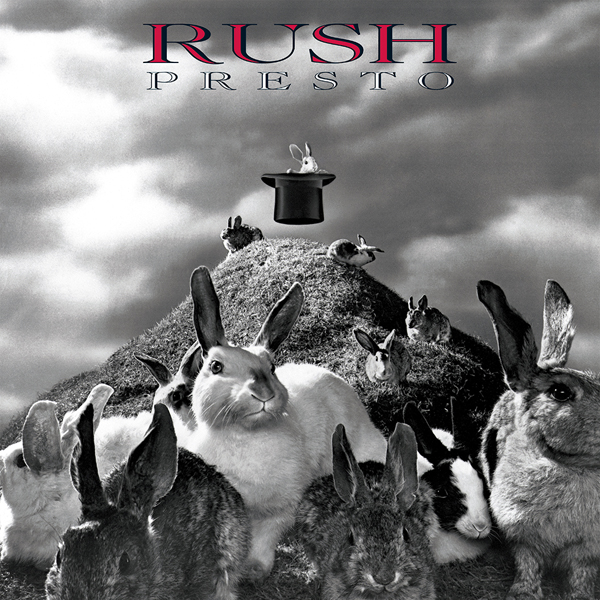
Nevertheless, it's obvious that there's still an awful lot of hardware around on Rush's current tour: back projected thematic 'movies', computerised lighting, hi-tech lasers ... not to mention sufficient bundles of sound-generating components and wires to make Rush sound at times like a 50-piece orchestra rather than a three-piece rock combo.
In terms of staging, their overall visual display is probably bettered only by the gargantuan productions of Pink Floyd. The audience loved it, often cheering just as much for a particular lighting change as for the music.
Neil: "Yeah, I noticed that, actually. I'm a bit of a fan of opera and I notice when I go to an opera that when the curtain goes up for Act Three and there's a beautiful set, the audience cheers for it. And it seems kinda funny to cheer for the set designer, but ... It's a beautiful thing, y'know?
"It's no insult to the music, and I think we're all confident enough about what we do that we don't feel threatened by the lights! Our live performances are really far more than the music. Not to be crass about it, I'd like to think that people go home and think, 'That was really worth spending an evening of my life and 20 dollars,' or whatever it cost them."
After years of putting out albums and touring, Rush have obviously built up a pool of very loyal fans, many of whom are going to react ecstatically to their shows no matter how well they play - and especially with such a 'multimedia'-type production of the Rush variety, where the music is only a part of the overall show. So is it difficult to come offstage and know whether they've played a good show?
Geddy: "That's a very good question. I think we know when we've played well. I think the bigger you get, and the bigger your name - or the myth of what you are - gets, and the more spectacular the show is, there's a kind of excitement factor that comes along with it. But I think you inherently know when you haven't played your best. I think all musicians know in their hearts, when they walk offstage, whether they played like bums or not.
"If mistakes are made, they're subtle. I think you do get to a point where the mistakes you make are mostly noticeable by yourself or maybe the sound guy who's mixing you every night. But it's very rare that giant mistakes happen. I mean, I always forget words. I don't think there's a singer alive that remembers all his lyrics. But that's more of a mental lapse than a flub.
"But I really don't know if making any one clunker is considered making a bad performance. There are certain nights when you just don't feel on top of it, where you feel like you gotta work a lot harder to stay in the pocket. And there are other nights where it's the opposite: you're playing so automatically that you're not really putting much into the show. And I think that's sometimes more noticeable by a crowd than where you make the odd clunker here and there.
"I guess to wrap the question up; I think a musician knows when he's not playing his best. But if he's the right kind of musician, his standards are pretty damn high, and hopefully if he falls short of that, it's still well within the realms of a good performance to the general public."
But with the expense of bringing such a big production to the UK, combined with the previously talked about rethink on touring in general, it looks as if Britain is again unlikely to get the chance to make any judgement on Rush's live performances.
Geddy: "It's important for us to play there. We've got very dedicated fans there, and we do appreciate that. The problem is we only get over there every four or five years, and for all the reasons that we've talked about, it's really inevitable. I'm sure the British fans would like to see us over there every tour. But as much as we'd like to be there, I don't think it's possible. It's a tough thing to organise.
"I feel very good about this tour and this show. I think it's a good show, and I'd like to take it around the world. But whether we can do that sanely still remains to be seen. We agreed to this tour in a 'let's take it one month at a time and see how I long it can last' way, and if everything goes well, we'll keep extending it."
Alex: "It's a long way to go and an expensive way to go with a big show for half a dozen dates. We can't play a lot of those places that we did 10 years ago. And we're not really that big in Europe to go and do big dates there. So you scale down the show and it's not very satisfying to do those kind of gigs. So, unfortunately, we tend to stay away from going over."
Even though I dislike interviewing band members individually, one advantage is that you can let each one have their say about the others. It's a question none of them seem happy with, although - with the exception of Neil Peart - when pressed, they're at least willing to offer basic sketches.
"Alex is very outgoing, very gregarious," says Geddy thoughtfully, and taking time to choose his words carefully, " ... a funny guy. There are not very many serious bones in his body. He loves to have a good time and as a musician, he's very instinctive. He's not a premeditative or composition-oriented kind of guy. I think that's one of his strongest attributes. He's also very technical minded - very scientific in his approach to a lot of things. The way his mind works, you could call him a music scientist.
"Neil is very solitary. His interests are wide, varied and exhausting. He's very much the same kind of personality that a long-distance runner or a marathon swimmer would have - almost unquenchable drive. One of the most remarkable people I've ever met, and probably ever will meet. If something's not a challenge, it's not interesting for him. He's incredibly well read. He's certainly not without a sense of humour, but he can be very distant. He's not an easy personality for a stranger to come in contact with, I think. But once you know him, he's a very warm and funny guy."
And where does Geddy Lee fit in?
"You'll have to ask them! They'll tell you. And I'm sure between the two of them you'll get some semblance of what kind of a goof I am."
Alex: "Well, Neil is quite a private person, and a very insular person. But at the same time he can be very open and really, really funny.
"Geddy's also got a really ... twisted sense of humour. He's a lot of fun, and he's up for anything. But he tends to be a bit of a worrier. He worries more than any of us about how the show's going, about how this is going or that's going. Everything is very important to him. He can get himself worked up at times.
"I'm probably in the middle somewhere. I think I'm pretty easy-going, and I'm quite a spontaneous person. I don't worry too much about things I don't need to worry about, and I sort of ... go with the flow. How American! How Californian!
"It shows in our writing, even. When Geddy and I get together to start working, the stuff that I write always happens very quickly, whereas Geddy's a lot more methodical, and he'll work on something until he knows it's the right thing. But I think we're all a bit perfectionist in our own way. Maybe Neil and I are not perfectionist so much as organisational nuts - both Virgos! Very nit-picking about organisation, but slobs at heart!"
Neil, on the other hand, is having none of it. A 'very private person', as Alex put it, he is also noticeably reticent to expose the privacy of his colleagues: "No! That's a nightmare question when you know somebody so well. It's like saying, 'Sum up your wife in a paragraph,' or something. You kind of feel it's futile."
What about whether the differences between the three of you is a strong point regarding how you work together?
Neil: "Yes, I think it absolutely is. To me the most important kinds of people in the world are those who make me laugh and those who make me think. And those two guys certainly exemplify both of those qualities."
Will we ever see Rush playing these shores again? Well, taking into account what's already been said, it's looking more unlikely than ever. And my own impression is there's a strong chance that before long, Rush could well exist only as a recording band. But maybe even that is questionable given Neil Peart's comments that, "For a band to be vital, it needs to be playing live," and Geddy Lee's admission that, "I would say that probably all our goals that we set out to achieve within Rush have been fulfilled."
A lot of between-the-lines reading could point to Presto being Rush's cue to jump into the magician's hat and disappear. So what's the deal, Neil?
"With the last album in particular, we were in a wide open position where our record contract had expired and we were absolutely free to work or not work as we saw fit. And basically the three of us just got together in the most informal way and said, 'Well guys, what do you want to do?' And we decided that we really wanted to make another record. And I can certainly see another one in the future."
